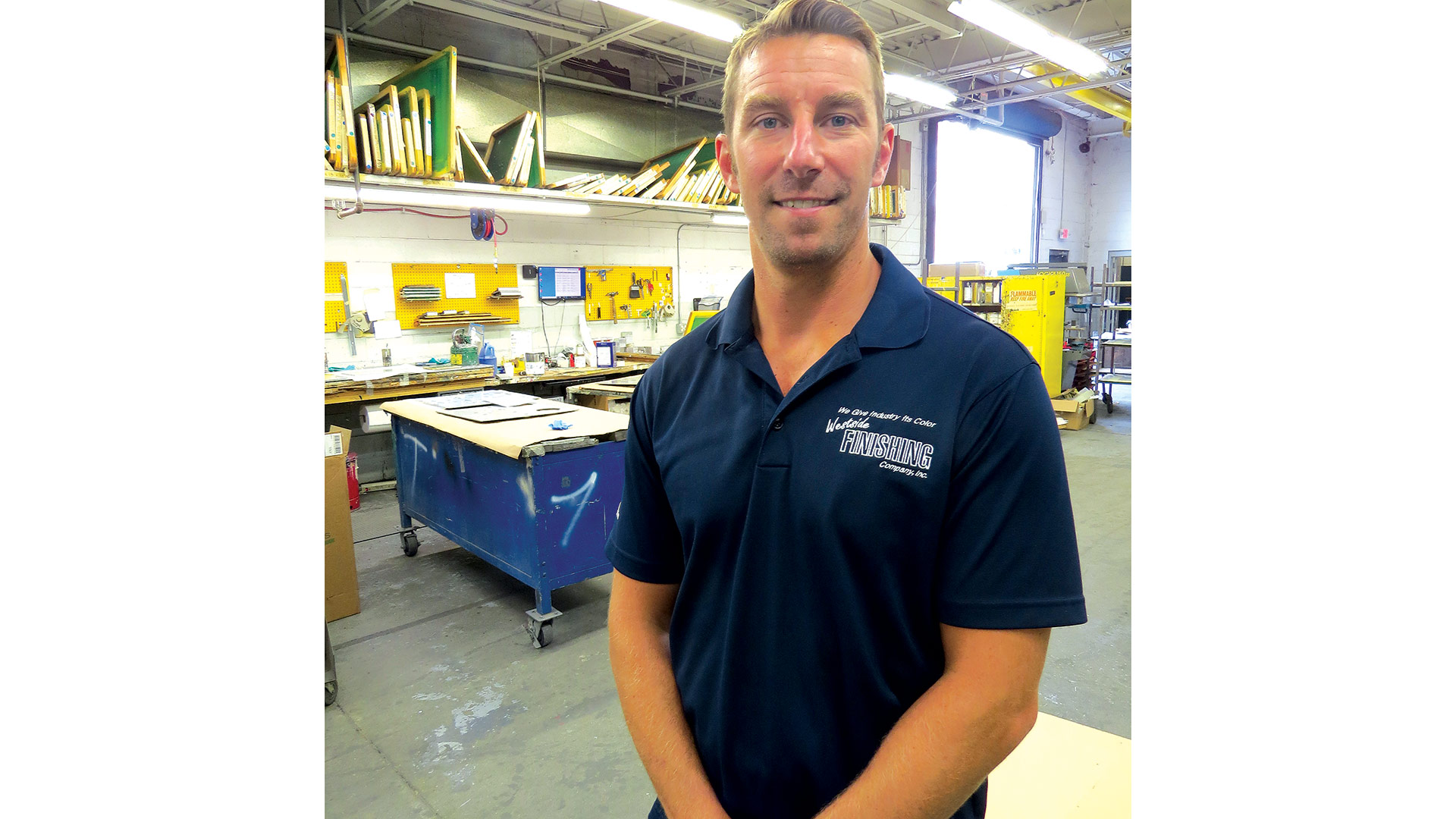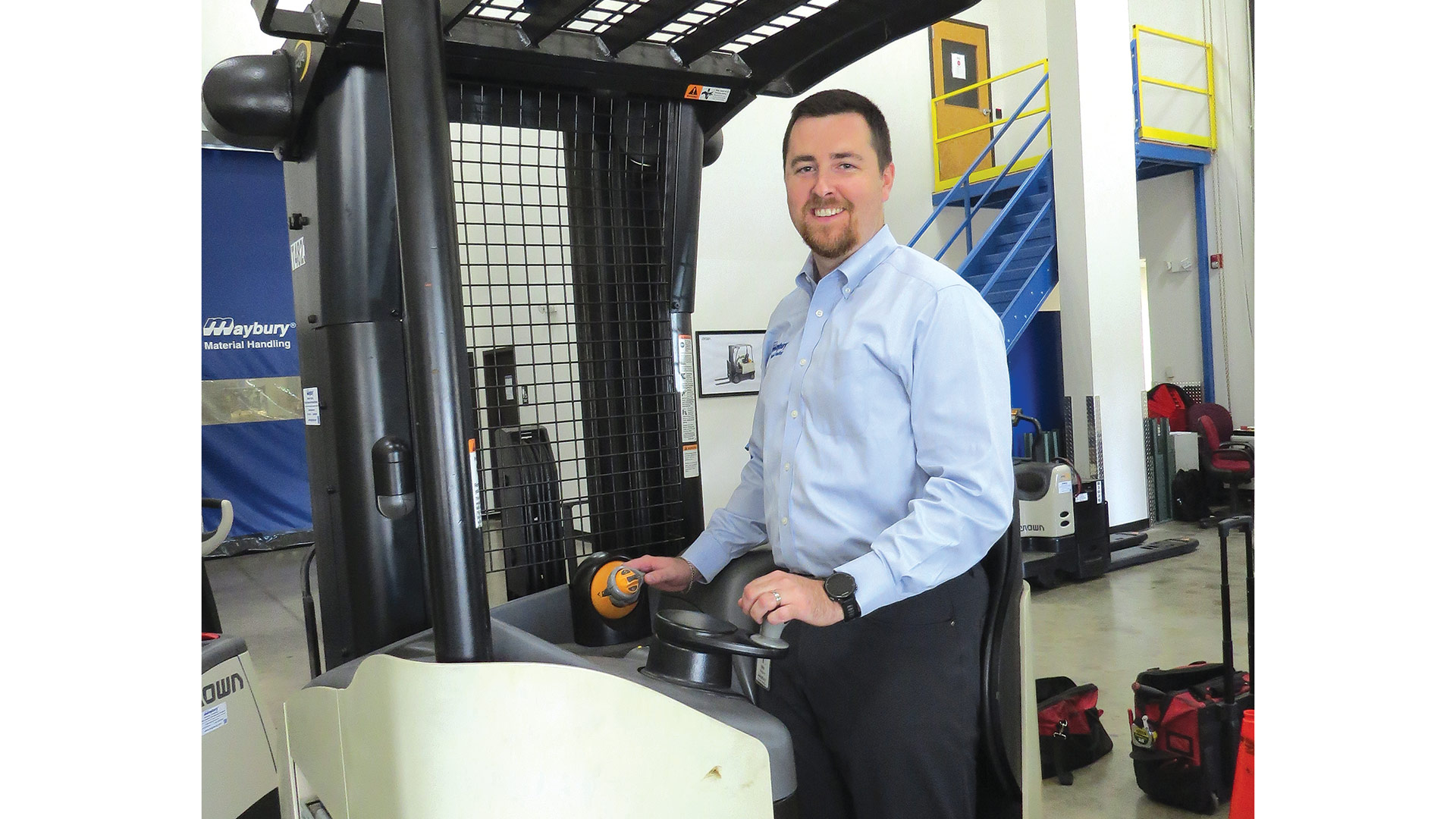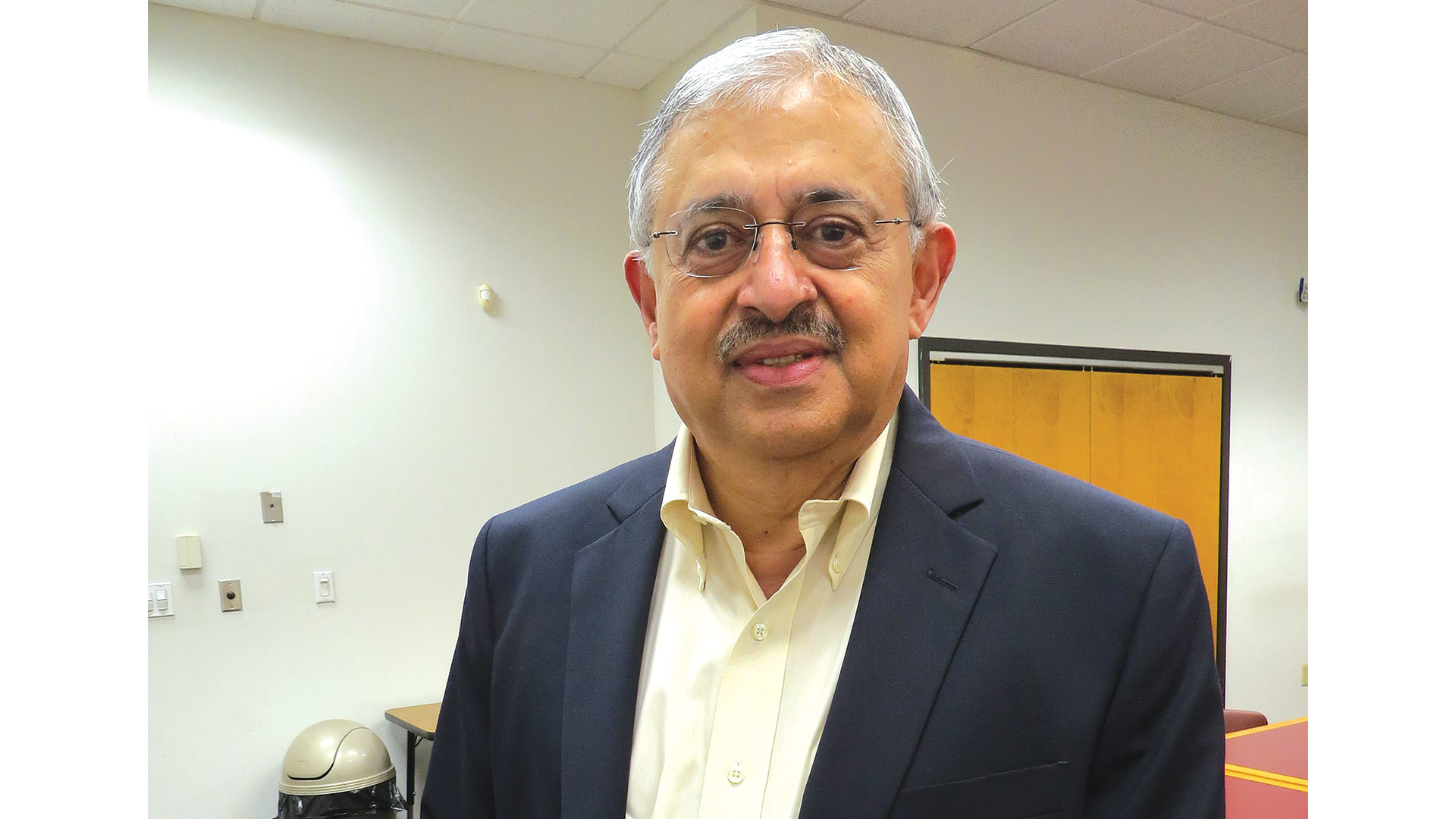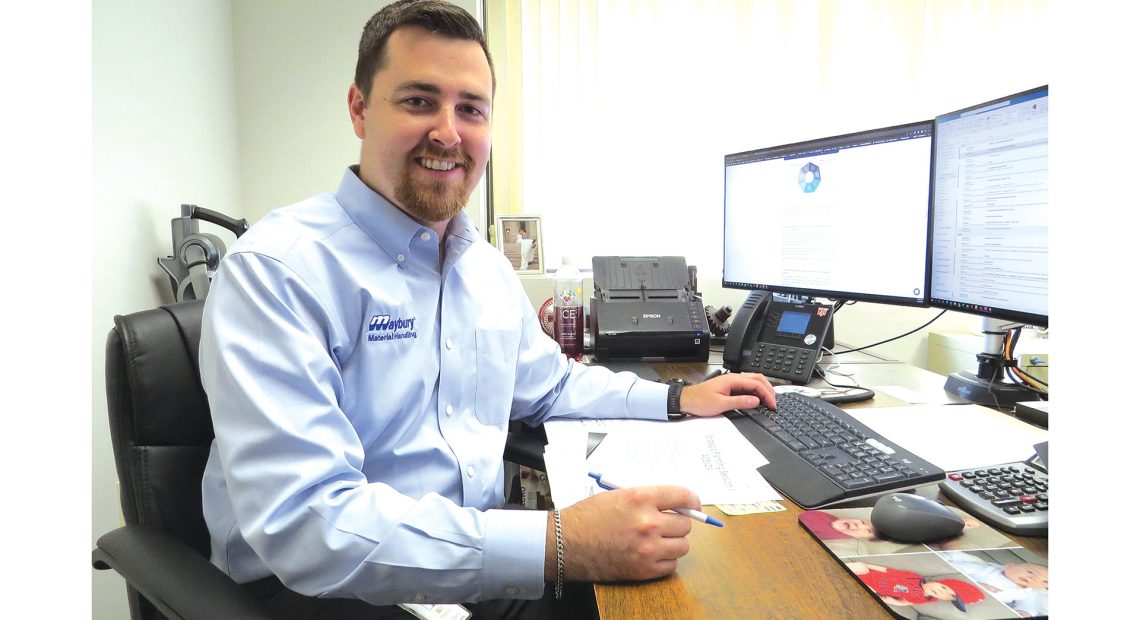Meetings of the Minds

Korey Bell says Vistage has acted like a board of directors for small companies who don’t have such a body, and has helped with some important issues.
Korey Bell had an issue.
It hasn’t been entirely resolved, but he’s making some real progress, thanks to some other business owners he was able to bounce things off.
The issue concerns pricing of the services provided by his company, Westside Finishing, which, despite that name, is based in Holyoke (yes, it started in West Springfield). More specifically, Bell noted that he held the line on prices, despite inflation and soaring costs of labor, material, and just about everything else, while almost all his competitors had raised theirs. He had questions about what to do and when, but needed a sounding board, like a board of directors.
And he had one in the form of a group of area business owners and managers — many of them in various stages of leadership transitions — called Vistage. This is a global entity with chapters across the country that total more than 23,000 members. The group now serving Western and Central Mass., led by business consultant Ravi Kulkarni, is in its infancy stages, having been formed in the spring.
Bell, the second-generation CEO who took over Westside Finishing from his father a few years ago, was one of the group’s first members. He credits the others in the room with being good listeners, solid providers of advice, and, perhaps most importantly, peers who will hold him accountable when he decides to move forward with something.
“We all do things differently, and that’s a refreshing perspective,” he said. “I may be thinking of attacking a problem one way, but at the meeting, some of the other members are able to ask the questions to get you looking at the problem in a different light. You might come into a meeting with a plan, and by the time you leave, you might have turned that plan on its head, but you’re more comfortable with the plan you came up with with the group then you were with your own.”
“You might come into a meeting with a plan, and by the time you leave, you might have turned that plan on its head, but you’re more comfortable with the plan you came up with with the group then you were with your own.”
Will Maybury, chief financial officer at East Longmeadow-based Maybury Material Handling, agreed. Maybury, son of company president and CEO John Maybury, is poised to take the helm at the company in a few years (there is no firm timetable) and he joined Vistage to help prepare him for that moment and learn from those who already have the title he aspires to.
“Where I saw the biggest value for myself is the growth opportunity the group provided me as someone coming into the CEO position,” Maybury said. “I’m able to surround myself with people who have been in the role and get an outside perspective, while also giving myself some personal growth and networking to help me transition into the role.”
Steve Graham, owner of Toner Plastics in East Longmeadow has been a Vistage member for more than a decade now. He’s not a member of the local group — instead he travels to Boston for meetings there — but is a firm believer of the organization’s power to bring minds together to address common problems and issues, and often help create answers.
“You have an opportunity to speak with other people who are in similar positions of leadership at their companies — entrepreneurs, owners, executives,” he said. “And having an advisory board of sorts, or a board of directors, which is what Vistage boils down to for many of us, is extremely valuable.

William Maybury, now in the process of succession planning
“You sometimes get reinforcement of an idea that you’ve been thinking about, and it’s just enough to push you over the edge to pull the trigger,” Graham went on. “And sometimes … you get a different view of the problem or the issues that you’re seeking to solve, and it pushes you in another direction; it’s extremely motivating for me.”
For this issue, BusinessWest talked with members of the local Vistage group about what they gain from participation, and how the monthly meetings have helped them become better leaders at a time when managing a business, large or small, has become ever-more challenging.
That’s the Idea
As he talked about his group and how and why it was formed, Kulkarni told BusinessWest that there was a clear need for such an entity in Western Mass., where there are few groups of this type focused on bringing young CEOs from diverse industries together around a conference room table.
Those that do exist are mostly regional, with Boston being the closest meeting place, and have requirements for membership that ultimately exclude many of the small businesses in this region. Vistage requires companies to have at least 25 employees and annual revenues of at least $5 million, which brings more area businesses into the mix, he said.
As for how it works, Kulkarni said it’s rather simple — when you put a dozen or so high-performing business executives in a room, these meetings of the minds have enormous potential for creating not only meaningful dialogue about the issues of the day — and there are many of them — but give and take that leads to problem-solving.
“You sometimes get reinforcement of an idea that you’ve been thinking about, and it’s just enough to push you over the edge to pull the trigger. And sometimes … you get a different view of the problem or the issues that you’re seeking to solve, and it pushes you in another direction; it’s extremely motivating for me.”
Elaborating, he said the hallmark of Vistage groups is something called ‘issue processing,’ a structured, thorough approach to helping members think through the dynamics of a challenge.
“It forces you to push beyond your assumptions and get to the real issues,” Kulkarni explained. “That’s critical to understanding and evaluating your options before making a decision and taking action.”
Such was the case with Bell and his issue with pricing and whether to increase his, which we’ll return to later. As he talked about it, Bell said that while Westside Finishing, a powder-coating operation that handles products ranging from cabinets to hand-dryers, has grown exponentially since his father started it as a one-person show and now boasts 65 employees, it is still, in most all respects, a small company.
“We’re not to the size where I would have a formal board of directors that I, as the president or CEO could lean on, bounce ideas off of, or help me with strategizing and planning for the future growth and development of our business,” he explained. “The members of Vistage are all people who have similar, high-level experience in running and managing a business, but at the same time, they have different backgrounds, very similar to what you would find on a board of directors.”
While Vistage is open to business owners and managers at all stages of their careers, Kulkarni said it is especially beneficial to those going through transition, be it in leadership or ownership.
Such was the case with Dave Boisselle, senior vice president of Operations for J. Polep in Chicopee, which has gone from being family owned to being owned by a large conglomerate, National Convenience Distributors. It’s not a small change, he told BusinessWest.
“When you’re sitting in the room and you’re talking corporate, it’s much different from family,” he said. “Family is family; everyone knows what they have to do, and they can talk to each other a certain way. Corporate is all professional, so you choose your words wisely and explain things in much more detail. It’s a much different structure.”
As for his transition to leadership of his company and how Vistage will ease that process, Maybury said he intends to be a sponge and “soak up as much as he can” at the monthly meetings with the goal of being more ready to take the helm. He said he benefits from being in a room where people at different points in their careers and different business situations, can thus provide different perspectives.
“Some people in our group are getting to the end of their careers and want to pass on some knowledge,” he explained. “I’m at the beginning, and some are in the middle; everyone is different, and that brings a lot of perspective to the table.”
Overall, Vistage provides value to members by bringing leaders of diverse businesses who are facing common issues and challenges together in a room to share what are usually different thoughts and approaches to those matters.

Ravi Kulkarni says the Vistage group he leads is diverse and looking to add new members from different sectors of the economy.
“People do things differently in their businesses — they have different ideas,” said Graham. “They may have different ways of financing their business that you haven’t considered, for example, and you make some friends.”
Ryan Clutterbuck, president of Pace Engineering Recruiters in Quincy, which specializes in finding artificial intelligence, robotics, autonomous vehicle and high-performance and quantum-computing engineers, and another member of the local Vistage group, agreed.
“It’s beneficial to have a group of people that you can share ideas within a safe environment, where they’re willing to give you direct feedback,” he told BusinessWest. “You can’t always run your ideas by people below you, so you need a group of peers who can give you honest and direct feedback, and that’s what I get out of Vistage.”
Such feedback is what Bell sought, and received, when he brought his ‘issue’ to the group a few months ago.
“This year has been the busiest year in company history — we’ve set four sales records from January up until now,” he said while setting the stage for the discussion that ensued. “The issue brought to the group was ‘I’m busier than I’ve ever been, my margins are pretty good, but I feel that I may be leaving something on the table … because a lot of competitors had gone up 10-fold from what I’d done as far as price increases since COVID started.’
“I wanted to make sure I was charging a fair-market price for the service that I’m offering and make sure I’m not leaving a lot of meat on the bone,” he went on, adding, without going into much detail about his actual plans, that members of the group were able to help him answer those critical questions and others that were brought to the table.
“You can’t always run your ideas by people below you, so you need a group of peers who can give you honest and direct feedback, and that’s what I get out of Vistage.”
This is the essence of issue-processing, said Kulkarni, adding that members ask clarifying questions and, by meeting’s end, have the member in question much closer to moving beyond asking questions and acting. And once this action is taken, these same group members will follow up and hold the members accountable for the actions taken, again, similar to the way a larger company’s board of directors would.
Boisselle agreed.
“When it comes to issue-processing, first members listen and then they ask questions and ultimately give suggestions,” he said. “And you start changing your perspective on how you’re going to do things; asking the questions gets you to start thinking, then the advice comes, and then you connect everything together and decide how to move forward.”
Clutterbuck brought his own issue — one of scalability and the personal mindset to accompany such possible growth — to the group and came away with the feedback he was seeking.
“I’d gone through the roller-coaster of ‘are you building to scale or are you building to get to a certain level and then sustain?’” he said. “So, I brought an issue to the table that was related to more my personal mindset of what should I be doing from a target standpoint and a growth standpoint that’s going to beneficial for both the company and the family and making sure I’m not burning out on either end.
“It certainly helped me reset and get back to the original plan that I had developed for the business and the direction I wanted to go in,” he went on as he recalled this issue-procession session. “It was a good conversation to have, because there’s no one else I can have it with.”
Meeting Expectations
Moving forward, Kulkarni said his immediate goal is to recruit more members — “we’re looking for those who are hungry, humble, and smart” — and bring the number of business leaders in the room closer to 12, the desired sweet spot.
Doing so will bring more voices to that table and more processing of critical issues facing area business owners and managers.
These company leaders do not have their own board of directors, but they can share one. And this is the essence of Vistage, summed up effectively and concisely by Clutterbuck.
“They say it’s lonely at the top; I don’t necessarily agree with that, but you don’t have a lot of sounding boards,” he said. “It’s not like you can bring these conversations to your employees or people within your organization because they’re deeply personal. This is a good group of people to have real conversations with.”
George O’Brien can be reached at [email protected]














